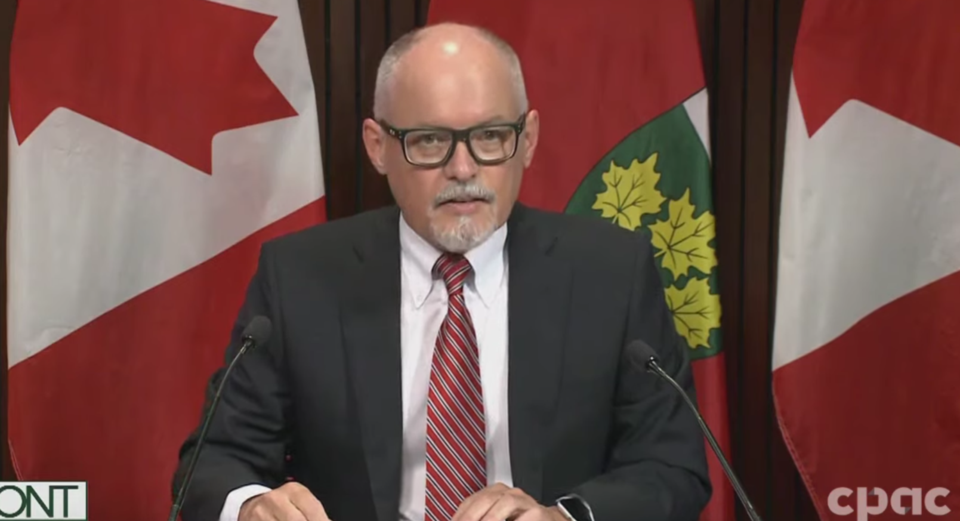The province has expanded eligibility for fourth doses of COVID-19 vaccine to include all adults aged 18 or older.
Ontario's Chief Medical Officer of Health Dr. Kieran Moore announced today (July 13) that starting tomorrow anyone aged 18 or older can get a booster if it has been at least five months since they received a third dose and at least three months since a COVID-19 infection.
The announcement came as Ontario is in its seventh COVID-19 wave, this one driven by the Omicron BA.5 subvariant. Moore said the province is seeing a slower trajectory for this wave and expects it to peak in about two weeks.
There's been an increase in the province's wastewater signals, the per cent positivity rates produced by lab testing, hospital admissions, and ICU admissions over the past few weeks as the seventh wave has been rising.
"We know it's the summertime now and people want to move past this pandemic, but it's a clear reality that we have to deal with this BA.5 variant and we need all Ontarians to come forward to get vaccinated," said Moore.
He confirmed pharmacy partners and public health units as well as primary care providers have been briefed on the new eligibility criteria for fourth doses, and through those partnerships, the province has the ability to vaccinate approximately 100,000 Ontarians per day.
"My most important message, which we've said consistently, is to stay up-to-date on vaccinations," said Moore. "We have capacity to immunize anyone interested in maintaining the level of protection we need in order to combat this nasty, aggressive virus."
Risk of hospitalization remains low for people between 18 and 59 years old who are healthy, without underlying conditions, and received a booster dose within the last six months.
When pressed about whether a healthy young adult actually needs a second booster dose, Moore reiterated his "call to arms" was for any adult with an underlying illness.
"For the general healthy individual, a healthy 19-year-old, if they've had their two-dose primer and a first booster, we know your level of protection is going to be very good in the next several months, and I would advise that it's not absolutely necessary at this point and you can wait for the fall booster dose," said Moore. "This dose is really for those that are vulnerable to this virus to continue to protect them."
Before today's announcement, fourth doses were available to high-risk individuals, including adults aged 60 and over, First Nations, Inuit and Metis people and any adults in their household, residents of long-term care homes, retirement homes, congregate settings, and people who are moderately to severely immunocompromised. Some of those groups are already eligible for a third booster as well (five doses total).
The increase in eligibility today, said Dr. Moore, is meant to include any adults, especially those with any underlying illness not included in the previous high-risk categories, whether related to heart, lung, kidneys, immune issues, etc. Moore also specifically mentioned those who smoke or have diabetes.
A new bivalent COVID-19 vaccine is expected in the fall, but Moore said it's still unclear what strains will be included. A bivalent vaccine is a combination of an old or original mRNA sequence of a virus plus a new sequence. It's possible the fall vaccine could be specific to an Omicron subvariant, though it's not yet clear which one it might include.
Moore said getting a fourth dose of a vaccine now would not preclude anyone from being eligible for a bivalent vaccine if and when it is approved in the fall.
Vaccinations can be obtained at local pop-up clinics, through pharmacies, and by booking an appointment through the Ontario COVID-19 vaccination portal online, or by calling the province's vaccine contact centre at 1-833-943-3900.
If you have questions about your vaccine eligibility, please contact the Provincial Vaccine Contact Centre at 1-833-943-3900 (TTY for people who are deaf, hearing-impaired or speech-impaired: 1-866-797-0007), which is open seven days a week from 8 a.m. to 8 p.m. and capable of providing assistance in more than 300 languages.
The Ontario government will also continue to provide free rapid antigen tests to the general public through existing channels like grocery stores and pharmacies, as well as to workplaces, schools, hospitals, long-term care and retirement homes and other congregate settings until December 31, 2022.
